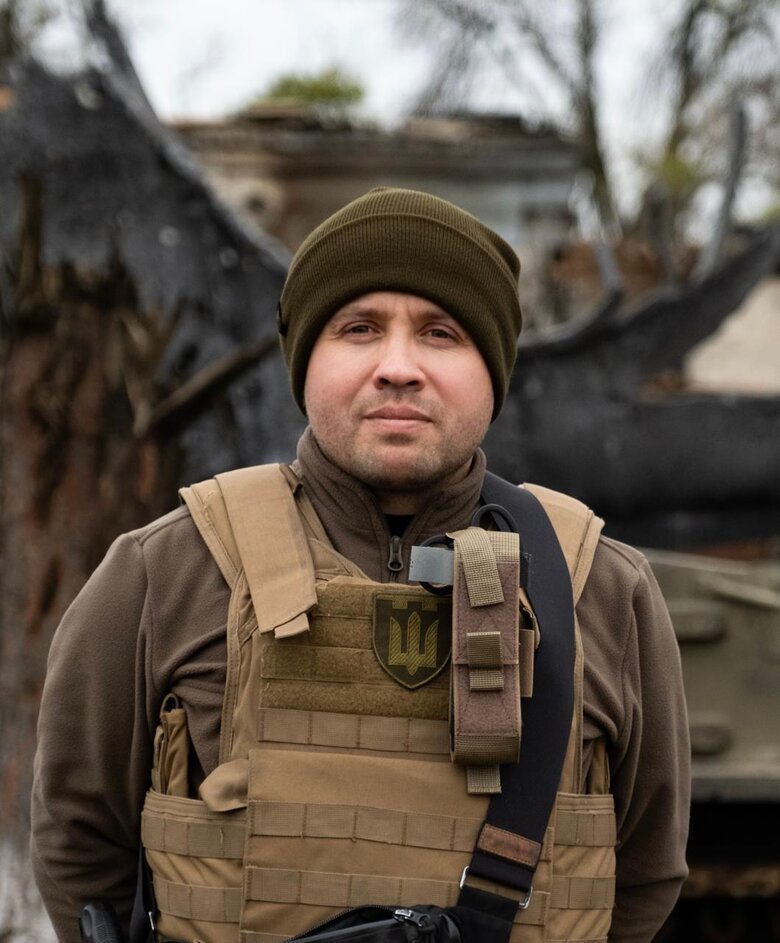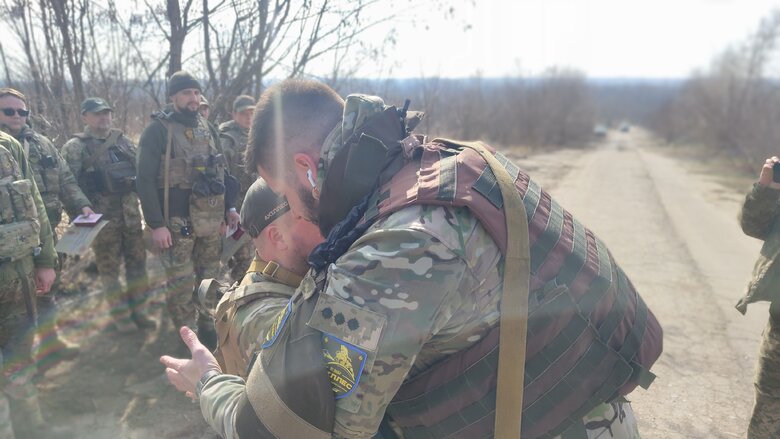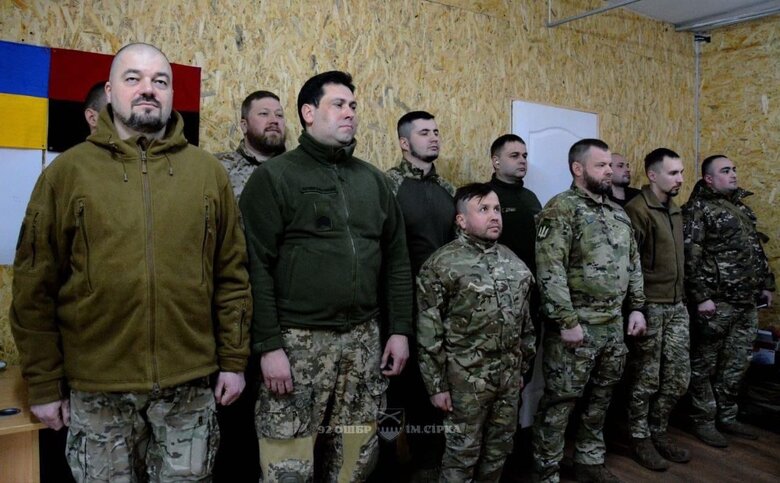Call sign Photon: "Russians are learning well and updating technologies. I wouldn’t say international sanctions are big obstacle here."
Viktor Khomenko is an energy engineer by training. Before the full-scale invasion, he was engaged in green energy and worked with renewable energy sources, including solar power plants. He is currently the deputy commander of the AHILLES strike unmanned aerial systems of the 92nd SAB. His call sign is Photon.
- When we mobilized, I started keeping registers of call signs. I came up with call signs for many guys," he tells me in an interview. - "I came up with one for myself. After all, a photon is an element of light that carries energy. And light is life.
- Before you mobilized, did you ever have a feeling that a full-scale war might start soon?
- I, like everyone else, saw what was happening around me - there was already a sense of a full-scale war in the air. It so happened that in early 2014, I chose the path of creating energy resilience systems to break away from Russia's monopoly. Ukraine needed to get off the gas needle of the Russian Federation, get rid of its dependence on the centralized electricity supply system and build distributed generation and networks that would provide greater resilience in wartime. This is how we are already seeing the spread of microgrids. I was involved in the creation of an energy cooperative in Slavutych. We planned to scale up such projects across the country. To do this, we created a corresponding training course at the Business School of the Ukrainian Catholic University. The first enrollment took place, where we already taught such energy cooperation so that we could share our experience and create similar projects. But it turned out differently.
- So the full-scale offensive was not unexpected for you?
- From my school days, thanks in part to my history teacher, it was clear to me who our enemy was. Then the events of 2004, then 2014. This is all one chain that led to a full-scale war.
- Did you prepare for it?
- More morally. I understood that Russia would attack sooner or later. All the intellectuals who followed these processes were talking about it. I relied on the opinions of Oksana Zabuzhko, Yaroslav Hrytsak and other prominent personalities of our time.
- How did you find out about the full-scale invasion? Did you see it on the news or, like many Ukrainians, heard the explosions?
- I woke up from the explosions. I opened the window. I could hear the aircraft working. I went online and understood everything. I packed my things. I took my mother to the village in Brovary district, visited my ex-girlfriend, helped her to buy things and pack, and in the evening went to the military registration and enlistment office. I signed up and on the night of 24-25 February, we were assigned to units. I was assigned to the fourth company. We received weapons. Commanders were appointed. We had Mr. Ivashko. For the next two months, the command changed. Until Yurii Fedorenko became the commander.
- Where were you in the early days?
- We were sent to the Chaika. There was no clear task. We started to organize ourselves. I took the initiative, was in constant communication, tried to find out what was going on, who understood the weapons we had. It turned out that there was one Azov soldier in our department and a dean who had been undergoing specialized training since 2014. They knew how to work with explosives. We had an idea to mine the takeoff strip - if there was an airborne assault, we reinsure ourselves. We were given permission, and the three of us started organizing the process. In addition, we dug trenches, prepared a defensive line, and set up duty. We stayed there for the first six days. After that, we were moved to the DCRP (Darnytskyi Car Repair Plant). Then - to the Brovary direction. Russian troops had already reached there and stopped on the line near Brovary. And on March 8, they came to my village, where I was born, and where my mother was at that time. There was no internet there, but the connection was working. People were hiding in cellars. We started to organize evacuation on our own. Our company organized a special operation to enter the " grey area". I told my mother over the phone how and when she and her neighbors could get to the neighboring village. We went there and met them. They evacuated about ten cars. I took my mom and then sent her to the UK, where my sister lives.
- You are not a military man. What were your first impressions when you saw the war with your own eyes?
- It was emotionally difficult for everyone. However, I had a quick psychological adaptation thanks to the proper level of stress resistance, critical thinking and decision-making skills. You have to accept reality, whatever it is, and quickly decide what you can do and act accordingly.
- I understand that these personal qualities led you to your current position as deputy battalion commander?
- This story started back at TDF (Territorial Defense Forces). The thing is, I've been trying to work remotely all my life. For the last eight years, I have always had a laptop with me. I took it to the war as well. When we had to receive a large number of weapons at the DCRP (we received NLAW, ammunition load, grenades), I was the only one with a laptop. Commander Ivashko asked me who I was. I answered that I was an engineer, a project manager in the energy sector. He entrusted me with the managerial function of accounting. So I started keeping registers of everything that came in. Later, when new people joined our battalion, I also registered them. I started working with Ivashko as a deputy company commander. And when Yurii Serhiiovych came to this position, he asked who had all the data? They pointed to me. The commander said: "You're coming to me for four days, passing on all the information, bringing me up to speed. Then - according to the regiment". Since then, we have been working together.
- But you are still in charge of the EW and EI area, right?
- We have commanders who manage the relevant units. I took the initiative and provided justification for the feasibility and necessity of their creation in our battalion. Because this is an integral part of the functioning of unmanned systems. They are all created and controlled with the help of radio electronics. Without interaction with electronic warfare equipment aimed at suppressing what we cannot see - radio waves - it is impossible to organize parallel and effective work. This important area needs to be understood and actively developed. Because the development of drones is just beginning. This is just the beginning of a great story of the future.
- Do we have perspectives for growth?
- Military production and technologies, especially in Ukraine, have not placed any bets on them. All support and supply of components is a mass market solution. Only a few items can be considered military products. Everything else is at an initial amateur level with problems of non-military solutions. It works sometimes and sometimes not. To accomplish the task with FPV drones, we need to understand that there are many risks of technological imperfection. That's why I say this is just the beginning. We are studying and learning. The unmanned systems are just being formed.
- The Russians are producing drones in full swing. They are also making progress in electronic warfare. I often hear from the military that the enemy has a large number of electronic warfare devices. What do you think about this?
- You know, we are learning from the Russians about systematic approaches. We see that they have a strategic vision of organizing the creation of infrastructure on the combat line. These are echeloned systems of electronic warfare, electronic intelligence, and unmanned systems of various types and functionalities. This is a centralized story. Our work is network-centric. We work more in networks. This means that we have efficient units that have learned and understood certain tools and create their own system. For example, we in the 92nd Brigade are inventing our own tactics and experimenting more. We have the problem of combining large networks with different approaches into a single one. This allows us to find more effective solutions faster. This happened, for example, with Mavic. We were the first to use them. Then the Russians learned from us and adopted our tactics. The same thing happened with FPV. That is why, along with the innovative experimental approach, we still need to create a system, which is what we are working on and trying to scale our experience to a company, then a battalion, and now we are set ourselves up for a larger-scale regiment creation process.
- Your battalion is now in the Kharkiv direction. What kind of drones are the enemy using here the most? FPV?
-"Yes, the most massive weapon is FPV. In our direction, we have plus or minus parity with the enemy in terms of numbers and activity in the sky. They have a lot of different types of reconnaissance drones - Zala, Supercam, Orlan. I can't compare, but the presence of these drones is observed 24 hours a day. And in all directions. They are supported by their highly effective means of destruction. We have not yet fully found effective means of countering them, but there are significant achievements in this direction.
- Are the Russians advancing in electronic warfare? Do you see anything new?
- Absolutely! They are just as good at learning, changing tactics and updating technology. I wouldn't say that international sanctions are a big obstacle here. They have enough support from China. They are at the level of Western technology. Their modern weapons of unmanned systems and electronic warfare are not inferior to our and NATO's analogues. The war gives them the opportunity and momentum for development. It is an incentive for this. That is why there is such a race of technologies. That's why we have such parity - no one else has caught up or overtaken us. That's why we have such a positional war.
- What is the most important thing in electronic warfare? As I understand it, at least being invisible to the enemy. And what else?
- A means of warfare is like a means of fire damage. In other words, we need to understand where to launch targeted electronic fire. Radio engineering and electronic intelligence are the first to give an answer. We need to saturate the line - to create an infrastructure of electronic intelligence means that will provide us with data on the radio situation around the clock. The most important thing is to correctly interpret and understand what we cannot see with our eyes. We are also focusing on this. When we understand the situation, we make decisions on countermeasures and tactics for using electronic warfare equipment together with reconnaissance and strike unmanned systems and artillery to suppress and destroy such enemy systems.
In addition, we use electronic intelligence to detect air defense systems, ground stations of unmanned systems that control drones. We are tracking them, monitoring them and then striking them.
- Is war becoming more and more technological?
- Yes. This is already a war of drones and electronic means. Various space technologies are being added at all levels. This development gives us the opportunity to make adequate and correct decisions about the enemy's tactics and strategy. For example, an offensive is always covered by such service forces - there are prerequisites for the infantry to attack, and they need to be created. We do the same thing in both offensive and defensive combat when we plan our actions.
- The enemy has become more active in your direction. Obviously, they are not going to stop...
- According to their political statements, they were never going to stop. Russia is clearly setting itself goals and making plans for the complete destruction of the Ukrainian state. It is strange for me to hear people saying that we can expect any kind of easing or stopping of their pressure. In May, there was the first wave of their offensive in our direction. We were able to stop it. They have drawn conclusions, regrouped and continue their offensive. This will probably continue for a very long time. We are in the active phase of the war.
- President Volodymyr Zelenskyy suggests that the hot phase of the war could end by the end of this year. What do you think?
- It's all about resources. If we can create a counterbalance - through the law on mobilization, the Armed Forces will be replenished, and new personnel can be trained to more effectively counter the enemy, then yes. In other words, if our state can provide the resources to stop the active phase. So far, we see that the Russians feel they have an advantage in resources, so they are intensifying their offensive in all directions. They see success in small victories, which suits them. Meter by meter, they are capturing our land. This tactic is successful. Although they implement it with great losses of manpower. We do not have enough effectively trained personnel to stop such an invasion.
- NATO Secretary General Jens Stoltenberg recently made the following statement: Europe and NATO should be prepared for the war in Ukraine to last for ten years. What do you think about this?
- I completely agree! In such circumstances, we need to build our strategy for decades. We need to start thinking not in terms of weeks, but to model different scenarios for at least 10-15 years. This applies not only to the war but also to the energy sector. Why do we have such huge problems here now? Because the full-scale war started unexpectedly, and until 2022, we had been quietly building ties with Russia, trading gas, electricity, etc.
- Now we have a huge problem with electricity, which is absent in some places for more than half of the day...
- This situation will get worse. They say that new nuclear power capacities are to be brought into service. However, high-voltage equipment is not designed for such rolling blackouts. Therefore, there may be many more emergency unplanned outages that are not related to missile attacks on infrastructure.
- So we are in for a very difficult winter?
- It's always better to prepare for the worst case scenario, so there are no questions. But in our country, representatives of the Ministry of Energy are still telling fairy tales.
- In the current circumstances, green energy, which you were involved in, is very useful. Do you follow what is happening here?
- I don't follow it much. But in general, I see that the way things are not regulated here is a disaster. In the two and a half years of war, it would have been possible to create some kind of sustainable system if the right decisions had been made.
- And we are still waiting for something. Like the collapse of Russia...
- You know, I don't consider it a catastrophe. This is simply our way to some kind of awareness, growing-up and the ability to teach our society to find common ground and act together with such painful lessons. This is the road to survival: either we draw conclusions and survive, or we are doomed to lose. This is the process.
- Evolutionary.
- Yes, it is a process of evolution, survival and development. You need to draw the right conclusions in time and not repeat mistakes.
Olha Moskaliuk, Censor.NET
Photos are provided by Photon







